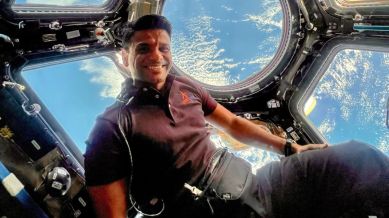Stay updated with the latest - Click here to follow us on Instagram
‘Mobile phone felt so heavy on Earth’: Astronaut Shubhanshu Shukla on challenges in space and back home
It was fun to do science in space, but challenging, astronaut Shubhanshu Shukla said, speaking about the milestones of the Axiom-4 space mission.

How can one become an astronaut? This, astronaut Shubhanshu Shukla remarked, is the most common question he is asked by children. “If children across Bharat are asking this question, we are halfway there and the rest is just enabling them,” Group Captain Shukla said on Friday, speaking about the intangible successes that the Axiom-4 space mission has brought to India’s young generation.
Shukla was one of the four crew members who spent 18 days aboard the International Space Station (ISS) during the Axiom-4 mission. He is currently in the US, undergoing rehabilitation after his maiden space sojourn that marked the return of an Indian in space after four decades.
The Axiom-4 crew—commander Peggy Whitson, Shukla, Sławosz Uznański-Wiśniewski and Tibor Kapu—were speaking for the first time during a media interaction after their return from space on July 15.
“The technical milestones (of the space mission) are measurable and crucial. But the mission was able to spark a belief in the young minds of India. This is where the future is beginning. The mission is a true success, and all the knowledge will be useful for India’s Gaganyaan programme. I appreciate that it takes efforts from a lot of people on earth to realise such a space mission,” Shukla said.
Shukla shared that he had been overwhelmed with congratulatory messages since his return a fortnight ago. “Mission exceeded all my expectations. The love, support and messages that came from every part of Bharat have filled me with a new purpose which whispers every day, since I have landed,” he said, adding, “I have done the homework well (that of noting down everything while at the ISS) as assigned by Prime Minister Narendra Modi. My interaction with the PM was special.”
Shukla said that all the experiments he performed have been brought back and dispatched to the respective research institutes in India.
“It is fun to do science in space, but it is challenging. I remember vividly, peering into the microscope and seeing the stem cells behave positively under microgravity and showing encouraging patterns. It was science in action, 400 km away from Earth. I felt a surge of pride for both the data and the scientists who made science come alive in space,” he said.
All the astronauts shared that they faced challenges adjusting to the microgravity environment, but agreed that the human body soon adapted to space conditions. “After a few days, space felt very natural,” said Kapu, who noted that folding clothes at the space station was a real challenge.
In the same manner, the return to Earth and adapting to gravity was no easy task, the three maiden space-faring astronauts remarked. “Holding the mobile phone felt so heavy when back on Earth,” Shukla said, recalling his early days back and trying to click a photo on his phone.
The Axiom-4 crew will spend another two weeks attending de-briefing sessions in the US before they head back to their respective countries. Shukla is expected to be back in New Delhi on August 17.